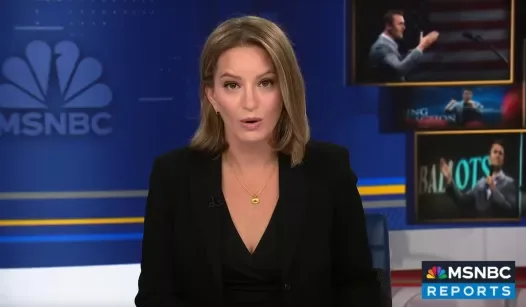In recent days, MSNBC’s coverage of conservative commentator Charlie Kirk has ignited significant backlash, raising questions about the network’s editorial choices and journalistic integrity. The removal of Kirk from a segment, while a step taken by the network, has not quelled the criticism surrounding the way the coverage unfolded. This incident highlights broader concerns about media bias and the responsibilities of news organizations in the current political climate.
Kirk, a prominent figure in conservative circles and founder of Turning Point USA, often stirs controversy with his views on social issues, education, and politics. His appearance on MSNBC was intended to provide a platform for discussion, yet it quickly devolved into a heated exchange that many viewers found troubling. Critics argue that the network’s handling of the situation reflects a pattern of dismissing conservative voices and failing to engage in constructive dialogue.
The backlash against MSNBC is emblematic of a larger trend in media, where partisan reporting can overshadow the fundamental principles of journalism. Many observers believe that the media’s role should be to inform the public without bias, offering diverse perspectives on political issues. However, incidents like the one involving Kirk illustrate the challenges faced by news organizations in maintaining neutrality while catering to their audience’s expectations.
Following the incident, MSNBC faced calls for accountability and transparency. Critics argue that simply removing Kirk from the segment does not address the underlying issues of media bias and the need for responsible reporting. The public’s trust in news organizations hinges on their ability to present information fairly and accurately, regardless of the political leanings of the individuals involved.
This situation has also sparked a broader conversation about the role of social media in shaping public perception of news coverage. As audiences increasingly turn to platforms like Twitter and Facebook for their news, the lines between opinion and factual reporting can become blurred. This trend raises important questions about how news organizations can adapt to the changing landscape while upholding journalistic standards.
Moreover, the incident has reignited discussions about the polarization of American politics. In an era marked by deep divisions between political ideologies, the media’s responsibility to foster understanding and dialogue is more crucial than ever. Engaging with opposing viewpoints can help bridge the gap between different perspectives, promoting a more informed and cohesive society.
As the debate continues, it is essential for viewers to critically evaluate the information presented by news outlets. Understanding the motivations behind coverage and recognizing potential biases can empower audiences to make informed decisions about the news they consume. In an age where misinformation can spread rapidly, media literacy is a vital skill for navigating the complexities of modern politics.
In conclusion, the controversy surrounding MSNBC’s coverage of Charlie Kirk serves as a reminder of the importance of fair and balanced reporting in today’s media landscape. While the removal of a pundit may be seen as a corrective measure, it does not resolve the deeper issues of bias and accountability that persist in the industry. As consumers of news, it is our responsibility to demand transparency and integrity from the media, ensuring that all voices are heard and respected in the ongoing political discourse.
